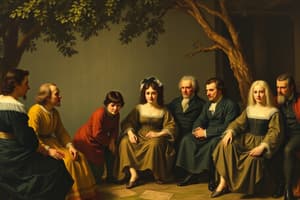Podcast
Questions and Answers
ইতিহাসের সূত্র থেকে যা অনুবাদ করা যায় 'generation' শব্দের মানের সাথে তার সম্পর্কিত কোনটি সঠিক?
ইতিহাসের সূত্র থেকে যা অনুবাদ করা যায় 'generation' শব্দের মানের সাথে তার সম্পর্কিত কোনটি সঠিক?
- ইতিহাসের গভীর অনুভূতি, গুরুত্ব, আনুভূতি
- প্রজন্মের বয়সের সাথে 'generation' শব্দের সম্পর্ক
- বিশুদ্ধভাবে প্রজন্মের নির্ধারিত বয়স্কতা ও ইতিহাসের প্রতিক্রিয়া সম্পর্কে (correct)
- ইতিহাসের শিক্ষা নিয়ে 'generation' এর ব্যাপারে
উপরের প্যারাগ্রাফে 'generation' এর বিশেষ উল্লেখ 'generation' শব্দ, 'labeling', 'crisis', 'innovations' - এর সাথে । ?
উপরের প্যারাগ্রাফে 'generation' এর বিশেষ উল্লেখ 'generation' শব্দ, 'labeling', 'crisis', 'innovations' - এর সাথে । ?
- ইতিহাসের উন্নয়নে (correct)
- নির্ধারিত 'generation' এর
- নির্ধারিত 'generation' -
- 'generation' -
'generation' - - ?
'generation' - - ?
- 'generation' -
- 'generation' - (correct)
- 'generation' - -
- 'generation' - -
প্রজন্মের ‘identifiable characteristics and influences on history and culture’ নিয়ে । ?
প্রজন্মের ‘identifiable characteristics and influences on history and culture’ নিয়ে । ?
ইতিহাস সম্পর্কে সঠিক কোনটি?
ইতিহাস সম্পর্কে সঠিক কোনটি?
‘Generations in history’-র সিদ্ধান্তের ভিত্তি কি?
‘Generations in history’-র সিদ্ধান্তের ভিত্তি কি?
AASLH-এর অনুসন্ধানের ফলাফল অনুযায়ী, ৪২% মানুষের কি?
AASLH-এর অনুসন্ধানের ফলাফল অনুযায়ী, ৪২% মানুষের কি?
'The concept of generations in history' -র উদ্ভাবনি হল?
'The concept of generations in history' -র উদ্ভাবনি হল?
এই প্রবন্ধে উল্লেখিত যেভাবে প্রজন্মের শিক্ষানীতির সাথে সম্পর্কিত, এটা কোন ধরনের অনুভূতির সাথে বিরোধিতা দেখাচ্ছে?
এই প্রবন্ধে উল্লেখিত যেভাবে প্রজন্মের শিক্ষানীতির সাথে সম্পর্কিত, এটা কোন ধরনের অনুভূতির সাথে বিরোধিতা দেখাচ্ছে?
AASLH-র 1500 জন আমেরিকানের সাথে পরিসংখ্যানের ফলাফল 42% -এর অনুপাতে, 42% - Gen Xers-র, 28% - baby boomers-র, 55% - Millennials-র - কোন ধরনের বৃদ্ধির সাথে?
AASLH-র 1500 জন আমেরিকানের সাথে পরিসংখ্যানের ফলাফল 42% -এর অনুপাতে, 42% - Gen Xers-র, 28% - baby boomers-র, 55% - Millennials-র - কোন ধরনের বৃদ্ধির সাথে?
'Lost Generation' (1883-1910), 'Greatest Generation' (1911-1944), 'Baby Boomers' (1946-1965), 'Generation X' (1966-1986), 'Generation Y' (1987-2001), 'Generation Z' (2001-2024) - য়ো. U.S. history-র timeline-টি ________?
'Lost Generation' (1883-1910), 'Greatest Generation' (1911-1944), 'Baby Boomers' (1946-1965), 'Generation X' (1966-1986), 'Generation Y' (1987-2001), 'Generation Z' (2001-2024) - য়ো. U.S. history-র timeline-টি ________?
AASLH-র survey-রা _______?
AASLH-র survey-রা _______?
History museums and historic sites ________?
History museums and historic sites ________?
'Generation X' (1966-1986) - _______?
'Generation X' (1966-1986) - _______?
'Generation Y' (1987-2001) - ________?
'Generation Y' (1987-2001) - ________?
'Generation Z' (2001-2024) - _______?
'Generation Z' (2001-2024) - _______?
Flashcards are hidden until you start studying
Study Notes
History is a subject that is often used to learn about the past, its events, and the people that have impacted the world. It is a foundation for strong and knowledge-growing generations, as it is essential for people to learn about history to build a strong and knowledge-growing foundation for the world[4-5]
Generations are often referred to as having identifiable characteristics and influences on history and culture. These are rather speculative, and there are a wide range of opinions as to how accurate or valid such labeling is However, they are used extensively in the political, business/marketing, and popular culture
The concept of generations in history is based on the theory that events, crisis, and innovations are responded to by a generation born at a particular time and growing to adulthood. These events are caused by previous generations, but they influence those growing up during the time and needing to face the consequences as adults
The American Association for State and Local History (AASLH) surveyed 1,500 Americans about their level of curiosity in history. The survey found that 42 percent of Americans now have a higher level of curiosity in history as compared to this time, with Millennials showing the highest level of increased curiosity, at 55 percent, compared to 42 percent of Gen Xers and 28 percent of baby boomers
The survey also demonstrated that America's history museums have broad appeal and respect, while also having a real personal impact on Americans. People connect with the past when they visit museums and historic sites, and award these institutions a credibility that is greater even than an eyewitness's account or a history books
The timeline of U.S. history that impacted each generation is as following:
- The "Lost Generation" (1883-1910) - TheProgressive Era, WWI, Roaring '20s, and Electricity/Auto
- The "Greatest Generation" (1911-1944) - TheDepression and WWII
- The "Baby Boomers" (1946-1965) - ThePost WWII, TV: Cold War/ Nuclear, 1950s and 1960s Civil Rights and anti War
- Generation X (1966-1986) -Mass Media and Computers
- Generation Y (1987-2001) - TheEnd of Cold War, Global Terrorism, increase of Fundamental Religions
- Generation Z (2001-2024) -Post 9/11, Micro/Mc world; wireless, Global Warming; Stem Cell/Genome
History is a subject that is often used to learn about the past, its events, and the people that have impacted the world. It is a foundation for strong and knowledge-growing generations, as it is essential for people to learn about history to build a strong and knowledge-growing foundation for the world[4-5]
The concept of generations in history is based on the theory that events, crisis, and innovations are responded to by a generation born at a particular time and growing to adulthood. These events are caused by previous generations, but they influence those growing up during the time and needing to face the consequences as adults
The American Association for State and Local History (AASLH) surveyed 1,500 Americans about their level of curiosity in history. The survey found that 42 percent of Americans now have a higher level of curiosity in history as compared to this time, with Millennials showing the highest level of increased curiosity, at 55 percent, compared to 42 percent of Gen Xers and 28 percent of baby boomers
The survey also demonstrated that America's history museums have broad appeal and respect, while also having a real personal impact on Americans. People connect with the past when they visit museums and historic sites, and award these institutions a credibility that is greater even than an eyewitness's account or a history books
The timeline of U.S. history that impacted each generation is as following:
- The "Lost Generation" (1883-1910) - TheProgressive Era, WWI, Roaring '20s, and Electricity/Auto
- The "Greatest Generation" (1911-1944) - TheDepression and WWII
- The "Baby Boomers" (1946-1965) - ThePost WWII, TV: Cold War/ Nuclear, 1950s and 1960s Civil Rights and anti War
- Generation X (1966-1986) -Mass Media and Computers
- Generation Y (1987-2001) - TheEnd of Cold War, Global Terrorism, increase of Fundamental Religions
- Generation Z (2001-2024) -Post 9/11, Micro/Mc world; wireless, Global Warming; Stem Cell/Genome
History is a subject that is often used to learn about the past, its events, and the people that have impacted the world. It is a foundation for strong and knowledge-growing generations, as it is essential for people to learn about history to build a strong and knowledge-growing foundation for the world[4-5]
The concept of generations in history is based on the theory that events, crisis, and innovations are responded to by a generation born at a particular time and growing to adulthood. These events are caused by previous generations, but they influence those growing up during the time and needing to face the consequences as adults
The American Association for State and Local History (AASLH) surveyed 1,500 Americans about their level of curiosity in history. The survey found that 42 percent of Americans now have a higher level of curiosity in history as compared to this time, with Millennials showing the highest level of increased curiosity, at 55 percent, compared to 42 percent of Gen Xers and 28 percent of baby boomers
The survey also demonstrated that America's history museums have broad appeal and respect, while also having a real personal impact on Americans. People connect with the past when they visit museums and historic sites, and award these institutions a credibility that is greater even than an eyewitness's account or a history books
The timeline of U.S. history that impacted each generation is as following:
- The "Lost Generation" (1883-1910) - TheProgressive Era, WWI, Roaring '20s, and Electricity/Auto
- The "Greatest Generation" (1911-1944) - TheDepression and WWII
- The "Baby Boomers" (1946-1965) - ThePost WWII, TV: Cold War/ Nuclear, 1950s and 1960s Civil Rights and anti War
- Generation X (1966-1986) -Mass Media and Computers
- Generation Y (1987-2001) - TheEnd of Cold War, Global Terrorism, increase of Fundamental Religions
- Generation Z (2001-2024) -Post 9/11, Micro/Mc world; wireless, Global Warming; Stem Cell/Genome
History is a subject that is often used to learn about the past, its events, and the people that have impacted the world. It is a foundation for strong and knowledge-growing generations, as it is essential for people to learn about history to build a strong and knowledge-growing foundation for the world[4-5]
The concept of generations in history is based on the theory that events, crisis, and innovations are responded to by a generation born at a particular time and growing to adulthood. These events are caused by previous generations, but they influence those growing up during the time and needing to face the consequences as adults
The American Association for State and Local History (AASLH) surveyed 1,500 Americans about their level of curiosity in history. The survey found that 42 percent of Americans now have a higher level of curiosity in history as compared to this time, with Millennials showing the highest level of increased curiosity, at 55 percent, compared to 42 percent of Gen Xers and 28 percent of baby boomers
The survey also demonstrated that America's history
Studying That Suits You
Use AI to generate personalized quizzes and flashcards to suit your learning preferences.




